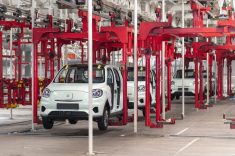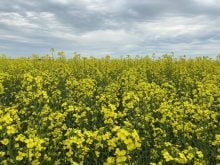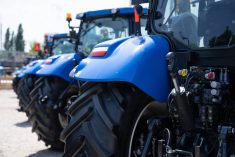CNS Canada — When Linamar announced it was purchasing MacDon Industries at the end of last year, there was trade uncertainty for Canada.
Since then, the issues have ballooned, but Linamar isn’t panicking.
“We’re trying to look past (the trade uncertainty) a little bit because there’s a lot going on there and we don’t know where things are going to pan out,” Linda Hasenfratz, CEO of Linamar, said Tuesday during a Winnipeg Chamber of Commerce luncheon.
In December, the Guelph-based manufacturing giant announced it would purchase Winnipeg-based agricultural equipment manufacturer MacDon for $1.2 billion.
Read Also

Pea, lentil outlooks have some positive signals – Penner
As pulse growers consider what to plant this spring, Chuck Penner of Leftfield Commodities Research said there is some optimism in the Canadian pulse market. Penner gave a presentation at the Saskatchewan Pulse Growers meeting in Swift Current on Feb. 4.
Linamar mainly manufacturers auto parts and owns one other agriculture manufacturer, Hungary-based Mezogep, which produces combine headers under the Harvestec brand.
The idea to purchase MacDon came after careful planning on Linamar’s part. A few years ago, the company decided to plan for its next 100 years by identifying future global challenges. Linamar chose six opportunities for growth from those challenges: transportation, infrastructure, food, water, power and an aging population.
To start, Linamar focused mostly on transportation and infrastructure, but the company also began exploring ways to address food production challenges. Linamar started to research what opportunities there were to buy an agricultural equipment manufacturers.
“(We) were thrilled to find (an agricultural manufacturer) almost in our backyard, right here in Canada, that we thought was a real world leader in terms of their harvesting product and could be a great cornerstone from which we would be build our global ag business,” Hasenfratz said about Linamar’s decision to buy MacDon.
Linamar plans to grow the MacDon business and keep operations in Winnipeg, according to Hasenfratz. While its agricultural focus is currently on MacDon, in the future it could look to acquire more agriculture companies.
“We will absolutely continue to build on our ag business both from a greenfield perspective or growing MacDon and its products and other products that they could potentially develop or maybe complement that with other acquisitions as well,” he said.
Linamar is a global company with offices and manufacturing plants all over the world — including in the U.S.
When Linamar bought MacDon, the North American Free Trade Agreement was being renegotiated — and since the MacDon deal closed in February, U.S. trade relations have become more strained, with U.S. President Donald Trump placing tariffs on steel and aluminum imports.
While Hasenfratz isn’t impressed with the current trade situation, she said Linamar isn’t making any rash decisions such as moving all manufacturing to the U.S. or out of the country.
“I prefer to focus on the facts and not the emotions and that’s how we’ve tried to manage through every situation, whether it be the economic crisis of 2009 or the political turmoil of 2018.”
Hasenfratz does, however, predict that if the trade issues aren’t dealt with quickly, there could be an economic recession.
“Trade wars are no joke. Ultimately we all suffer higher costs; higher costs reduce demand, reduced demand means markets go down, economy collapses, a lot of people lose their jobs and that means more reduced demand,” she said.
— Ashley Robinson writes for Commodity News Service Canada, a Glacier FarmMedia company specializing in grain and commodity market reporting.
















